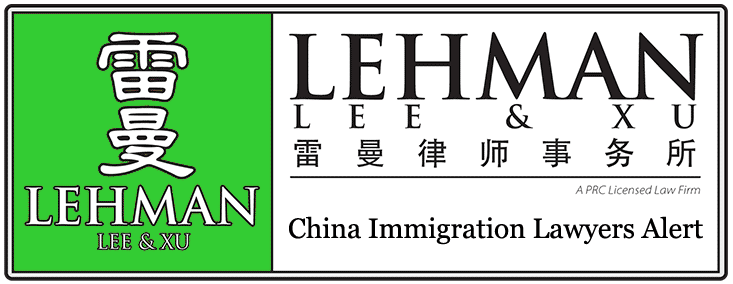

 |
LEHMAN, LEE & XU China Lawyers |
China Immigration Lawyers Alert |
February 2015:Online Edition |
|
The China Law News keeps you on top of business, economic and political events in the China. |
|
|
|
In the News |
Investor blues |
With the CE deciding to suspend a 12-year-old program that allowed millionaires from the mainland to run tax-free operations in HK, perhaps it's time to review what went wrong. Cheng Yingqi reports. Critics are virtually unanimous in their view that Hong Kong's investor immigration program needs a review. Detractors of the program feel, for the most part, investor immigrants have proved to be more of a liability than an asset to the local economy. They did little to create new jobs, increase local competitiveness, bring innovative ideas, or contribute salaries and business taxes. Their effect was to exacerbate social tensions already present in Hong Kong. As the cost of basic consumer products, services and real estate seem to hit the roof, social inequalities - between the native Hongkongers of modest means and the wealthy immigrant from the mainland - become even more jarring. The moneyed mainlanders cut across social stereotypes - business tycoons, leading scientists, TV and movie stars and athletes, including Zhang Ziyi, former Olympic gymnastics champion Liu Xuan, and acclaimed pianist Lang Lang. Most mainland immigrants had no desire to work in Hong Kong, or even live here. "Seventy percent of my clients who acquire Hong Kong residence are entrepreneurs from small counties who do not speak English. Hong Kong is their first choice because there is no language problem. The other 30 percent are businessmen from larger cities, who use Hong Kong as a currency transit point, where they may settle accounts in dollars. Either way, the great majority of immigrants live their normal lives on the mainland after acquiring Hong Kong residency," explained Xu Zuhong, president of Guangzhou-based migration agent Dacheng Immigration. "Most important of all, Hong Kong did not charge taxes on offshore companies, which made the SAR very popular among wealthy entrepreneurs," Xu added. Experts agree that Hong Kong was overdue for a change in its immigration policy. "Hong Kong's immigration policy took a wrong turn in the past 11 years. The policy didn't play the role it ought to have played - bringing in the talent, industry restructuring and innovation that Hong Kong needs," said Ma Jianbo, a council member at the local think tank Wisdom Hong Kong. Ma explained that the policy was beneficial in the beginning, but over time the programs - for investor immigrants, talented people, professionals and entrepreneurs - did little to replenish the labor pool or increase the tax base. The Hong Kong government started the Capital Investment Entrant Scheme on Oct 21, 2003. There was a recession in those days. By Dec 31, 2014, the program had approved 25,504 immigrants, 89 percent of them Chinese nationals from the mainland Initially the program required a minimum investment of HK$6.5 million. There was a listing of "permissible assets" under the program - but no stipulation requiring applicants to start a business or join one in Hong Kong. The program's shortcomings come into sharper focus with the assistance of figures released by the Statistics and Immigration Department, revealing that the investment immigration program poured some HK$42.59 billion into the city's real estate sector between 2003 and 2011. On Oct 13, 2010, among measures to curb skyrocketing real estate prices, the government increased the investment threshold to HK$10 million, and suspended real estate from the list of permissible investments. Ma pointed out that in 2010 almost all the luxury villas and most apartments under HK$2 million in Hong Kong were sold to wealthy immigrants from the mainland. Spiraling property prices |
|
|
|
|
| Proud Member of |